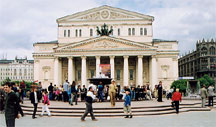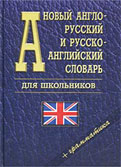|
1.
|
Going by foot vs. going by vehicle
|
|
|
Russian distinguishes between going
somewhere on foot and by vehicle. For going on foot the verb идти is
used. For going by vehicle the verb ехать is used.
|
|
|
Click the following statements to listen, then read them aloud.
|
|
|
|

|
|
Он идёт
в библиотеку.
|
Он едет в библиотеку.
|
|
He is going (walking) to
the library.
|
He is going (driving) to the library.
|
|
|
|
Notes
-
The verb ехать is used with all kinds of
vehicles: машина - car, автобус - bus, велосипед - bicycle, мотоцикл -
motorcycle, etc. The vehicle could be mentioned or not. If the vehicle is
mentioned, it is in the prepositional case with the preposition на. Compare:
Он едет в библиотеку на машине. - He is going to the library by car.
Он едет в библиотеку на автобусе. - He is going to the library by
bus.
Он едет в библиотеку на велосипеде. - He is going to the library by
bicycle.
|
|
|
Notes
-
The infinitive of the verb идти is slightly different
from the other verbs we have learned: it has -ти
at the end instead of regular -ть ending. The stress is on the ending,
that is why е changes to ё in ты,
он, мы, and вы forms.
-
The infinitive stem of the verb ехать is different from the
present tense stems: еха- changes to ед- in all present tense
forms. The stress is on the stem in all forms.
|
|
|
|
|
3.
|
Saying "Let's go"!
|
|
|
There are different ways to "Let's go!" in Russian.
1. Addressing one person in an informal way, say:
|

|
|
Пойдём!
|
or
|
Пошли!
|
(on foot)
|
|
Поедем!
|
or
|
Поехали!
|
(by vehicle)
|
|
|
|
Notes
|
|
|
2. Addressing more than one person or addressing one person in a formal way,
say:
|

|
|
Пойдёмте!
|
(on foot)
|
|
Поедемте!
|
(by vehicle)
|
|
|
|
|
|
4.
|
Asking Where: Где? vs. Куда?
|
|
|
Russian has two different words for one English question word Where: Где and
Куда.
|
|
|
Где (Where) is used to ask about location.
|

|
|
- Где ты живёшь?
|
- Where do you live?
|
|
- Где ты работаешь?
|
- Where do you work?
|
|
- Где ты учишься?
|
– Where do you go to school?
|
|
|
|
You already know that when talking about location, the prepositions в and на
are used before the noun that indicates location and the noun is in the Prepositional
case.
Examples:
|

|
|
- Где работает Таня?
- Она работает в библиотеке.
|
- Where does Tanya work?
- She works in the library.
|
|
- Где работает Иван?
- Он работает на стадионе.
|
- Where does Ivan works?
- He works at the stadium.
|
|
|
|
|
|
|
Куда (Where to) is used to ask about destination.
|

|
|
- Куда ты идёшь?
|
- Where are you going to?
|
|
- Куда ты едешь?
|
- Where are you going/driving to?
|
|
|
|
When talking about destination, the same prepositions в and на are use before
the noun that indicates destination. The noun that indicates destination must
be in the Accusative case.
Examples:
|

|
|
- Куда идёт Таня?
- Она идёт в библиотеку.
|
- Where Tanya is going?
- She is going to the library.
|
|
- Куда едет Иван?
- Он едет на стадион.
|
- Where Ivan is going/driving to?
- He is going to the stadium.
|
|
|
|
|
|
|
Exercises Упражнения
|
|
|
|
Practice using different forms of the verb идти
|

|
|
Practice using different forms of the verb ехать
|

|
|
Accusative or Prepositional
|

|
|
Где or Куда
|

|
|
|
|
|
|
|
Reading Чтение
|
|
|
Текст
I. Read the text and translate it into English.
|
|
|
|
Сегодня воскресенье - выходной день. Олег и Алла не
работают. Днём они едут в магазин купить
продукты, а вечером они идут в Большой театр
на балет "Щелкунчик". Их дочка Оля тоже идёт в театр,
а сын Игорь идёт на стадион играть в хоккей.
II. Answer the questions.
1. Олег и Алла сегодня работают или отдыхают?
2. Куда они едут днём?
3. Куда они идут вечером?
4. Куда идёт их дочка?
5. Куда
идёт их сын?
|

Москва, Большой театр
|
|
|
III. Write your translation and answers on paper and check with the

|
|
|
|
|
|
|
|
|
|
|
Диалоги
I. Read the dialogues and translate them into English.
|
|
|
|
1. - Привет, ребята! Куда вы идёте?
- Привет, Игорь! Мы идём в кинотеатр
смотреть фильм. Пойдём с нами*!
- Спасибо, но сейчас я не могу*.
Иду на стадион играть в хоккей. Скоро
соревнование - я должен* много тренироваться.
- *Ну, как хочешь. Удачи!
- Спасибо! Увидимся* завтра в шко
ле.
|

Москва, стадион "Лужники"
|
|
|
*с нами - with us
*я не могу - I can't
*должен - have
to, must
*Ну, как хочешь. Удачи! - Well, as you wish.
Good luck!
*увидимся - see
you
|
|
|
|
|
|
|
2. - Мама, поедем в книжный магазин! Я хочу
купить новый англо-русский словарь!
- А где твой старый словарь? Потеряла?
- Нет, не потеряла. Просто он слишком маленький.
Я изучаю английский уже два года и мне нужен
новый большой англо-русский и русско-английский
словарь.
- Хорошо, поедем! Купим тебе большой
словарь.
*мне нужен - I need
*тебе - for you
II. Answer the questions.
1. Куда идут ребята?
2. Куда идёт Игорь?
3. Куда идут ребята?
4. Какой словарь хочет купить дочка?
|

Словарь
|
|
|
III. Write your translation and answers on paper and check with the

|
|
|
|
|
|
|
|
|




